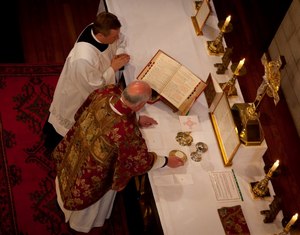 For Catholics it is Sunday, not the Sabbath (Saturday) in the technical sense as it applies to Jewish theology, but it is the day of worship of the One Triune God in the Triumph of death by death itself; it is Sunday which commemorates the Resurrection of Jesus, that is the fulfillment of the Paschal Mystery (life, death, Resurrection and Ascension of the Lord). Sunday is the perpetual Day of the Lord in practice.
For Catholics it is Sunday, not the Sabbath (Saturday) in the technical sense as it applies to Jewish theology, but it is the day of worship of the One Triune God in the Triumph of death by death itself; it is Sunday which commemorates the Resurrection of Jesus, that is the fulfillment of the Paschal Mystery (life, death, Resurrection and Ascension of the Lord). Sunday is the perpetual Day of the Lord in practice.
From the earliest days Christians understood each Sunday as a “Little Easter” and it is celebrated with great seriousness. But Christians never forgot to celebrate, Easter, the Resurrection of the Lord, with great solemnity preceded by a period of preparation we call Lent and the Sacred Triduum. The Lord’s Day is observed, the Mystical Body of Christ hopes, as a day of rest and worship of God that is demanded of us by the Third Commandment. It is THE day of the week on which the making of money and being a slave to work is turned on its head (CCC 2172).
What do holy days teach us? Why does the Church bother insisting on them today? In the spiritual sense holy days are a gift in the same way Sunday is a gift. Recall that the key gift God gave us in the Decalogue is rest, just as He rested. The gift of the Sabbath, and observing the Sabbath, is looking for meaning, knowing with certitude that we are children of God who live in freedom. The Sabbath is THE time to reflect upon Someone and Something greater than we are. We are made for the Infinite, not the finite. If we apply the gift of Sunday, of the Sabbath to the point of observing holy days we will notice that that one’s holy day observance is another way to make real the graces of Easter in ordinary life. As the great French scholar Father Louis Bouyer once wrote, we are “grafted upon Him [Christ] so that the same life which was in Him and which He has come to give us may develop in us as in Him and produce in us the same fruits of sanctity and love that it produced in Him.”